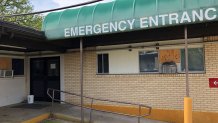The sign on the sliding glass doors to the emergency room reads “CLOSED, IN CASE OF AN EMERGENCY, CALL 911”.
The Van Zandt Regional Medical Center in Grand Saline shut its doors in August, leaving a county of more than 55,000 people with no hospital at all.
Just 70 miles from Dallas, Van Zandt is one of many rural Texas counties now facing the COVID-19 crisis without a hospital, or without many advanced ICU beds needed to care for the most critically ill.
NBC 5 Investigates discovered at least 94 counties across Texas have no ICU beds. Some counties in North Texas on the edges of the Metroplex are among those with no ICU, or just a handful of ICU beds, according to the latest data available from the federal government’s medicare cost reports.
North Texas Hospital Beds by County.
Disclaimer: This data was obtained from the federal government’s 2018 Medicare Cost Reports. This is the most current data available. Data is self-reported by a hospital.
Data: Centers for Medicare & Medicaid Services
Analysis: Ron Campbell and Eva Parks
The reports show Cooke and Erath counties with just five ICU beds. Fannin County hospitals reported having only two. Even Johnson and Kaufman counties, which each have more than 100,000 residents, have just seven or eight ICU beds in each county, according to the data.
That means COVID-19 patients from many rural communities will be sent to hospitals in Dallas and Fort Worth, adding stress to a system that’s already being stretched in a community where hundreds have a tested positive for the virus so far.
Some of those rural patients are already arriving, according to Dr. Rob Hancock, president-elect of the Texas College of Emergency Physicians who works for a group that staffs emergency rooms in larger cities in North Texas and Oklahoma.
“At some of these hospitals, half the patients we've got with COVID weren't actually from the community the hospital is in -- they're being transferred in from these rural areas,” said Hancock, who added that DFW-area hospitals must be ready to take in more patients from small towns.
“Fortunately, we have a very robust hospital system in the area. But again, there's also a lot of people in Dallas-Fort Worth, and those people rely on those hospitals as well. So you're kind of getting hit from both sides,” Hancock said.
Local hospitals said they’re already planning for that surge.

“So we're looking at that. We're considering that. And you are right on when you talk about the rural counties could be impacted more dramatically in some ways than we would,” said Stephen Love, DFW Hospital Council CEO/president.
Hospitals in Dallas and Tarrant counties have about 800 ICU beds combined. They also have thousands of additional acute care beds, some of which are now being converted to ICU beds in the current crisis. That could help handle an influx of patients from surrounding areas.
So far, Van Zandt County has only reported two cases. But in Grand Saline, where the hospital sits closed, Mayor Jeremy Gunnels said there’s concern about the elderly if the virus strikes the community.
“We have a large percentage of our population north of 65. We have three nursing homes here in town,” said Gunnels.
In nearby towns like Canton, they worry about the hundreds who are already sick and not very far away in Dallas.
“We're on the beginning cusp of this thing, and I don't see any chance of it letting up anytime soon. I do see more cases breaking out here,” said Canton Mayor Lou Ann Everett.

The death of rural Texas hospitals is a truly a crisis, according to the Hospital Council’s Love. A crisis that could now impact the big cities too if rural communities are hit hard by COVID-19.
Changes in Medicare and private insurance reimbursements have made it harder for rural hospitals to survive.
In Van Zandt County, COVID-19 has re-kindled conversations about the old hospital’s future. County officials have floated the idea of re-opening it if an outbreak occurs.
“I was really surprised to learn that they literally just locked the door and walked out. So the equipment is still there. Of course, we would still need doctors and nurses,” said Everett.
Meanwhile, in small towns, many are praying their communities won’t be touched.
“Our best defense is really just managing the opportunity for spread,” said Gunnels.

